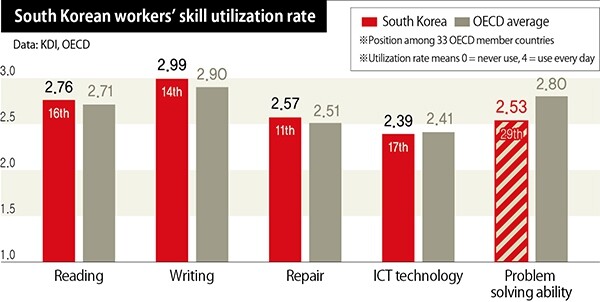hankyoreh
Links to other country sites 다른 나라 사이트 링크
Report: South Korean workers strong in reading and writing, lack problem solving skills

South Korean workers show strong results in their use of reading and writing skills but inadequate problem-solving capabilities, a report by a state think tank concluded. The findings are prompting calls for measures to improve problem-solving capabilities as a key capability demanded by the jobs of the future.
In a July 3 report titled “South Korean Adult Capabilities and Avenues for Improvement: On Problem-Solving Skills,” Korea Development Institute (KDI) senior research fellow Kim Yong-sung said South Korean company employees ranked just 29th among 33 OECD member countries for their use of various skills to solve problems. Problem-solving capabilities are defined as the ability to grasp and solve issues where the answer is unclear.
In contrast, South Korean workers rated favorably on the usage of individual skills. For the different skills used in the workplace, they ranked 16th in the OECD for reading, 11th for mathematical ability, and 17th for ability to use information and communications technology. Ultimately, the results can be interpreted as showing that workers rarely use individual skills to solve problems related to work.
Between 2012-2016, the OECD conducted surveys of language, math, and ICT capabilities among adults (ages 16 to 65) in its member countries. The report uses these survey data to assess skill usage by South Korean workers.
Use of problem-solving abilities was found to be low in the high-skill positions that place greater problem-solving demands on workers, including executive, managerial, and professional positions. In contrast, clerical workers showed the highest usage of skills such as reading and writing, rating above the OECD average for use of problem-solving capabilities.
According to the report, the biggest factor was a lack of opportunities for South Korean workers to acquire specialized knowledge connected with their jobs. Rigid workplace cultures with inadequate human interchange and cooperation were also cited as a factor reducing the use of problem-solving capabilities. In addition to the ability to grasp and analyze situations, problem-solving also requires social skills and the ability to cooperate and communicate with others.
The report also cited labor market polarization, and the resulting high barriers between regular and irregular workers, as another structural factor. The argument is that workers feel less motivated to show their problem-solving skills in unstable or poor working environments, while companies neglect to work toward developing their workers‘ capabilities.
In the report, Kim stressed the need to “build problem-solving capabilities through stronger on-site occupational education and training.” In particular, the report predicted that the number of jobs demanding problem-solving capabilities would grow with the arrival of the Fourth Industrial Revolution.
The report also said the current system for professional skill education should be reorganized with a stronger on-site focus. To achieve this, it suggested explaining the “work-based learning” that is currently being implemented on a limited basis, while also bolstering “project-based learning” that emphasizes the problem-solving process.
Improvement of the labor market structure was also mentioned as a long-term task.
“Instead of ‘flexible staffing adjustments’ where they hire and fire according to business conditions, companies need to be encouraged to respond elastically in terms of wages and working hours,” the report said.
“With stable employment conditions, companies and workers will be able to acquire and make use of problem-solving capabilities,” it suggested.
By Noh Hyun-woong, staff reporter
Please direct questions or comments to [english@hani.co.kr]

Editorial・opinion
![[Editorial] Does Yoon think the Korean public is wrong? [Editorial] Does Yoon think the Korean public is wrong?](https://flexible.img.hani.co.kr/flexible/normal/500/300/imgdb/original/2024/0417/8517133419684774.jpg) [Editorial] Does Yoon think the Korean public is wrong?
[Editorial] Does Yoon think the Korean public is wrong?![[Editorial] As it bolsters its alliance with US, Japan must be accountable for past [Editorial] As it bolsters its alliance with US, Japan must be accountable for past](https://flexible.img.hani.co.kr/flexible/normal/500/300/imgdb/original/2024/0417/6817133413968321.jpg) [Editorial] As it bolsters its alliance with US, Japan must be accountable for past
[Editorial] As it bolsters its alliance with US, Japan must be accountable for past- [Guest essay] Amending the Constitution is Yoon’s key to leaving office in public’s good graces
- [Editorial] 10 years on, lessons of Sewol tragedy must never be forgotten
- [Column] A death blow to Korea’s prosecutor politics
- [Correspondent’s column] The US and the end of Japanese pacifism
- [Guest essay] How Korea turned its trainee doctors into monsters
- [Guest essay] As someone who helped forge Seoul-Moscow ties, their status today troubles me
- [Editorial] Koreans sent a loud and clear message to Yoon
- [Column] In Korea’s midterm elections, it’s time for accountability
Most viewed articles
- 1[Column] The clock is ticking for Korea’s first lady
- 2[Editorial] When the choice is kids or career, Korea will never overcome birth rate woes
- 3[Guest essay] How Korea turned its trainee doctors into monsters
- 4[Editorial] As it bolsters its alliance with US, Japan must be accountable for past
- 5S. Korea, Japan reaffirm commitment to strengthening trilateral ties with US
- 6Korea, Japan jointly vow response to FX volatility as currencies tumble
- 7Gangnam murderer says he killed “because women have always ignored me”
- 8Japan officially says compensation of Korean forced laborers isn’t its responsibility
- 9[News analysis] After elections, prosecutorial reform will likely make legislative agenda
- 10‘Right direction’: After judgment day from voters, Yoon shrugs off calls for change